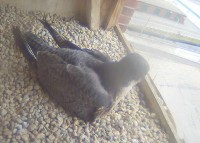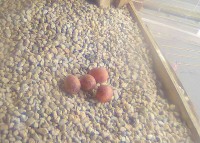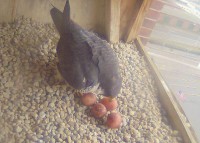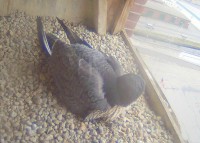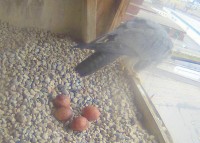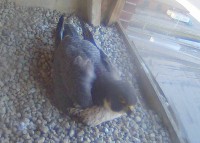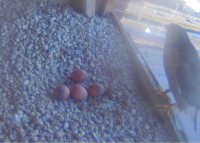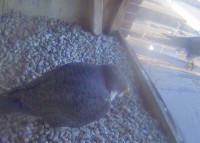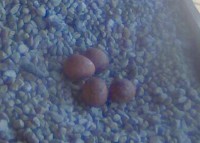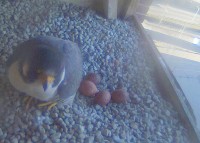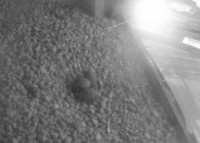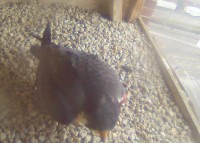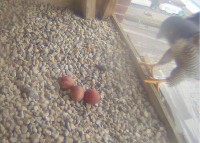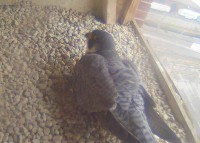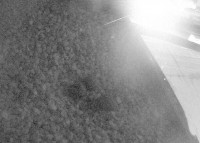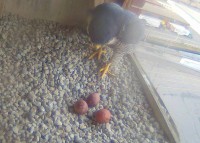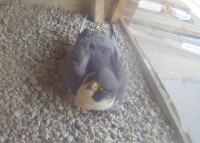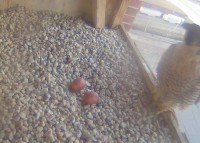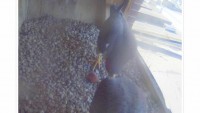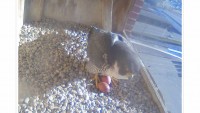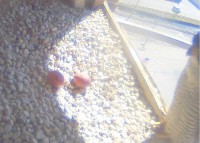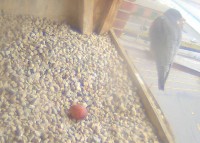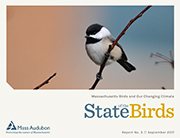Lawrence Peregrines: early embryo develops?
April 17, 2018 in In the Nest Box, lawrence peregrines, Peregrine Falcons Eastern Massachusetts, Peregrine Falcons Massachusetts
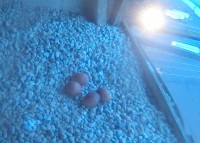 The peregrines started the day with overcast skies, winds from SW at 13MPH and temp at 48F. The forecast for today calls for mostly cloudy skies, with a high near 51F, west wind 7 to 11 mph, with gusts as high as 21 mph.
The peregrines started the day with overcast skies, winds from SW at 13MPH and temp at 48F. The forecast for today calls for mostly cloudy skies, with a high near 51F, west wind 7 to 11 mph, with gusts as high as 21 mph.
Had a look in just before 6AM and the male was incubating. He took off in flight and returned a minutes later. Again, he was very fidgety around the eggs, and hovered near and over eggs, but continued to behave in a tentative way. The female returned and started wailing at him. He departed and she settled right in over he eggs in motherly incubation mode.
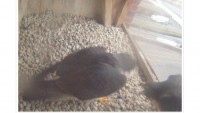 Many questions have come in about exactly what happens during incubation, in terms of embryonic development. It is a fascinating question and related to the very mystery of life, and how young peregrines develop inside the egg. So, what happens when?
Many questions have come in about exactly what happens during incubation, in terms of embryonic development. It is a fascinating question and related to the very mystery of life, and how young peregrines develop inside the egg. So, what happens when?
Over the next number of days, we’ll look a bit closer at how the embryo develops. Resources will include two book on avian embryonic development and an old blog, specifically about peregrine falcons, that includes a number of entries on this topic.
The age of the embryo when the egg is laid varies. Peregrines tend to lay eggs during the night or early morning or in the evening.; if the egg is not complete until later in the day, it will probably not be laid until the next day. The rate of development of the embryo once the egg is laid also varies. If the eggs are cooled after laying, development of the embryo ceases until the temperature rises again. Development can resume even after the eggs have been cooled for several days. The temperature of eggs incubated by their mother is 106 degrees Fahrenheit The temperature of course will vary when the peregrine leaves the eggs to eat, etc. All of this affects the rate at which the embryo develops and, therefore, how long it takes for the chick to hatch.
The first 4 days are essential. A lot is going on in those 4 days. Let’s have a closer look inside the eggshell. It is a magic journey through the universe of the dawning of life itself.
First Day: The Journey Begins
Before the Egg is Laid:
* The egg is fertilized.
* The zygote divides and begins to grow.
* The cells segregate into groups of specialized function.
* The embryo nearly stops growing between laying and incubation.
During Incubation:
* The area pellucida and area opaca of the blastoderm develop.
MAJOR EVENTS
Second day:
*27 hours: The alimentary tract appears.
*28 hours: The brain crease begins to form.
*29 hours: Somites appear.
*31 hours: The brain and nervous system begin to form.
*32 hours: The head fold begins to form.
*34 hours: Blood islands appear.
*35 hours: The eyes begin to form.
*37 hours: The heart begins to form.
Third day
*52 hours: The ears begin to form.
*58 hours: The heart starts to beat
Fourth Day
*76 hours: head turns to the left
*78 hours: Amnion has enclosed the embryo
*80 hours: Allantois begins to form
*88 hours: The beak begins to form.
*92 hours: The leg begins to form.
*94 hours: The wings begin to form
Literature cited: Veldhuis, Froona, Embryo: the first four days, Sept. 6, 2008,
http://falcoperegrinus-froona.blogspot.com/2008/09/embryo-first-4-days.html
